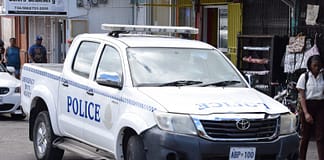Dear Editor:
Many of us grew up in the Caribbean in the last century believing that bushes and weeds were awful sights that needed to be gotten rid of whether on land or water.
Similarly, we never gave much thought to land, water, or air because we assumed that they would always be there in more or less the same manner in which they then existed.
We never wondered about noise, the stuff that industries emitted in the air or poured into the earth and the water, or how animals and plants are affected by all of this.
Today we know differently, don’t we? Yet are we really using that different knowledge to ensure that we protect and sustain the environment for our health and the future of life on earth?
Perhaps it’s time to be reminded that one person of passion and perseverance can make a difference and that all it takes is one person to start a movement. So, what can we as individuals do?
For starters, there’s no question that cutting back on meat consumption could have real and lasting effects.
And, in the Caribbean, perhaps there is need to revert to the traditional practice of kitchen gardens that will enable a supply of organic vegetables, herbs, peas and beans and even fruits, while greening the environment and playing a part in carbon reduction.
In fact, today so much can be planted in small spaces or even in hanging pots or elevated wooden trays.
As well, we should join with teachers and students to green the schoolyards and create eco environments for our children at school and agitate for agriculture to be brought back to school curricula.
We also need to change our views about bushes and weeds. Instead of getting rid of them we need to recognize their values and nurture them, without allowing any one type to overwhelm the others. As well, where necessary, let’s rewild patches of bare land while fostering wetlands.
Their presence will bring back birds, insects and even animals, all of which play significant roles in so many ways.
In our farms and gardens let us eliminate use of herbicides and pesticides when possible and use the least dangerous ones only if needed or revert to organic nurturing of plants. If possible, we should even try various types of agriculture such as organic, aquaponics and shade agriculture.
Let us not wantonly cut down trees, not even in our yards. Instead, plant, plant, and plant some more, including fruit and flowering trees. The former increases our access to fresh fruits; the latter beautifies the environment, and both contribute to reducing our carbon footprints.
Our attitudes to wildlife must also be reengineered so that we don’t instinctively kill them. In fact, if we find them outside of their environment, we should return them to the wild.
We must stop littering especially since all our garbage that’s not biodegradable pollute the earth and often end up in the streams, rivers and oceans not only polluting but destroying aquatic life.
We must also develop the recycle habit along with a conservation attitude. Avoid using plastic as much as possible. And if you must use it, ensure its not single use plastic but plastic that can be reused. And let us be very careful about introducing plants and animals to environments in which they do not belong. They could easily become invasive and create havoc in their new environments.
Finally, let us become cleaning brigades, regularly cleaning our surroundings and communities, our waterways, and our beaches. After all we’re not only doing this for ourselves but as a legacy for our children, their children and posterity. What greater bequest can we offer them than a clean and safe environment?
Annan Boodram
My Heart Walks With You
T h e C a r i b b e a n V o i c e
Saving Lives, Empowering People
Five minutes of your time can save a life
Advertise with the mоѕt vіѕіtеd nеwѕ ѕіtе іn Antigua!
We offer fully customizable and flexible digital marketing packages.
Contact us at [email protected]

















Thank you for this thoughtful article within this forum. Whether you wrote as a result of recent Privy Council ruling with regards to the Airport being built on Barbuda; or its part of your ongoing health and wellness philosophy. It speaks to the challenges we are faced with in the Caribbean and captures a cross section of the rich environment we take for grant-age or are mistaken about.
Environmental awareness and appreciation of our flora and fauna begins at home and continues through the education system.
As our world changed; in the Caribbean our educational system did not adopt to our changing world.
The Caribbean public is not aware that it’s most valuable physical resources are the quality of its environment. Our natural environment is being destroyed by the man-made environment, mostly in pursuit of short-lived economic goals, for the prestige on which our value system is now based.
A supermarket cart filled with unhealthy packaged foods, is of more prestigious than a backyard garden filled with fruit trees and vegetables. The idea of reuse and recycle is an anathema to our values. To get one’s hands in the soil to produce healthy food is considered demeaning.
The Caribbean lives in a world of contradictions. We play lip service to the idea that global warming has an adverse effect of our economies, and we pursue the idea of SIDS Conferences to make a case for compensation.
We are just as culpable in destroying our own environment; with our public policies as well as our everyday habits, which has a destructive effect on our environment.
Our value system has to change first in conjunction with education.
Comments are closed.